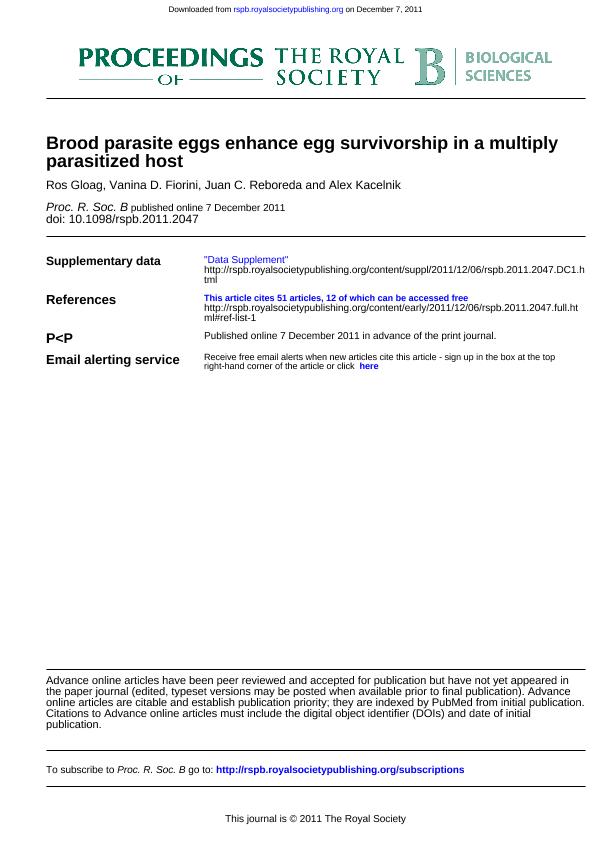Mostrar el registro sencillo del ítem
dc.contributor.author
Gloag, Ros

dc.contributor.author
Fiorini, Vanina Dafne

dc.contributor.author
Reboreda, Juan Carlos

dc.contributor.author
Kacelnik, Alex

dc.date.available
2019-01-17T21:03:09Z
dc.date.issued
2012-05
dc.identifier.citation
Gloag, Ros; Fiorini, Vanina Dafne; Reboreda, Juan Carlos; Kacelnik, Alex; Brood parasite eggs enhance egg survivorship in a multiply parasitized host; The Royal Society; Proceedings of the Royal Society of London. Series B: Biological Sciences; 279; 1734; 5-2012; 1831-1839
dc.identifier.issn
0962-8452
dc.identifier.uri
http://hdl.handle.net/11336/68232
dc.description.abstract
Despite the costs to avian parents of rearing brood parasitic offspring, many species do not reject foreign eggs from their nests.We show that where multiple parasitism occurs, rejection itself can be costly, by increasing the risk of host egg loss during subsequent parasite attacks. Chalk-browed mockingbirds (Mimus saturninus) are heavily parasitized by shiny cowbirds (Molothrus bonariensis), which also puncture eggs in host nests. Mockingbirds struggle to prevent cowbirds puncturing and laying, but seldom remove cowbird eggs once laid. We filmed cowbird visits to nests with manipulated clutch compositions and found that mockingbird eggs were more likely to escape puncture the more cowbird eggs accompanied them in the clutch. A Monte Carlo simulation of this 'dilution effect', comparing virtual hosts that systematically either reject or accept parasite eggs, shows that acceptors enjoy higher egg survivorship than rejecters in host populations where multiple parasitism occurs. For mockingbirds or other hosts in which host nestlings fare well in parasitized broods, this benefit might be sufficient to offset the fitness cost of rearing parasite chicks, making egg acceptance evolutionarily stable. Thus, counterintuitively, high intensities of parasitism might decrease or even reverse selection pressure for host defence via egg rejection.
dc.format
application/pdf
dc.language.iso
eng
dc.publisher
The Royal Society

dc.rights
info:eu-repo/semantics/openAccess
dc.rights.uri
https://creativecommons.org/licenses/by-nc-sa/2.5/ar/
dc.subject
Egg Rejection
dc.subject
Evolutionary Equilibrium
dc.subject
Host Defence
dc.subject
Mimus Saturninus
dc.subject
Molothrus Bonariensis
dc.subject
Risk Dilution
dc.subject.classification
Otras Ciencias Biológicas

dc.subject.classification
Ciencias Biológicas

dc.subject.classification
CIENCIAS NATURALES Y EXACTAS

dc.title
Brood parasite eggs enhance egg survivorship in a multiply parasitized host
dc.type
info:eu-repo/semantics/article
dc.type
info:ar-repo/semantics/artículo
dc.type
info:eu-repo/semantics/publishedVersion
dc.date.updated
2019-01-16T18:20:11Z
dc.journal.volume
279
dc.journal.number
1734
dc.journal.pagination
1831-1839
dc.journal.pais
Reino Unido

dc.journal.ciudad
Londres
dc.description.fil
Fil: Gloag, Ros. University of Oxford; Reino Unido
dc.description.fil
Fil: Fiorini, Vanina Dafne. Universidad de Buenos Aires. Facultad de Ciencias Exactas y Naturales. Departamento de Ecología, Genética y Evolución; Argentina. Consejo Nacional de Investigaciones Científicas y Técnicas; Argentina
dc.description.fil
Fil: Reboreda, Juan Carlos. Universidad de Buenos Aires. Facultad de Ciencias Exactas y Naturales. Departamento de Ecología, Genética y Evolución; Argentina. Consejo Nacional de Investigaciones Científicas y Técnicas; Argentina
dc.description.fil
Fil: Kacelnik, Alex. University of Oxford; Reino Unido
dc.journal.title
Proceedings of the Royal Society of London. Series B: Biological Sciences

dc.relation.alternativeid
info:eu-repo/semantics/altIdentifier/doi/http://dx.doi.org/10.1098/rspb.2011.2047
dc.relation.alternativeid
info:eu-repo/semantics/altIdentifier/url/https://royalsocietypublishing.org/doi/full/10.1098/rspb.2011.2047
Archivos asociados
